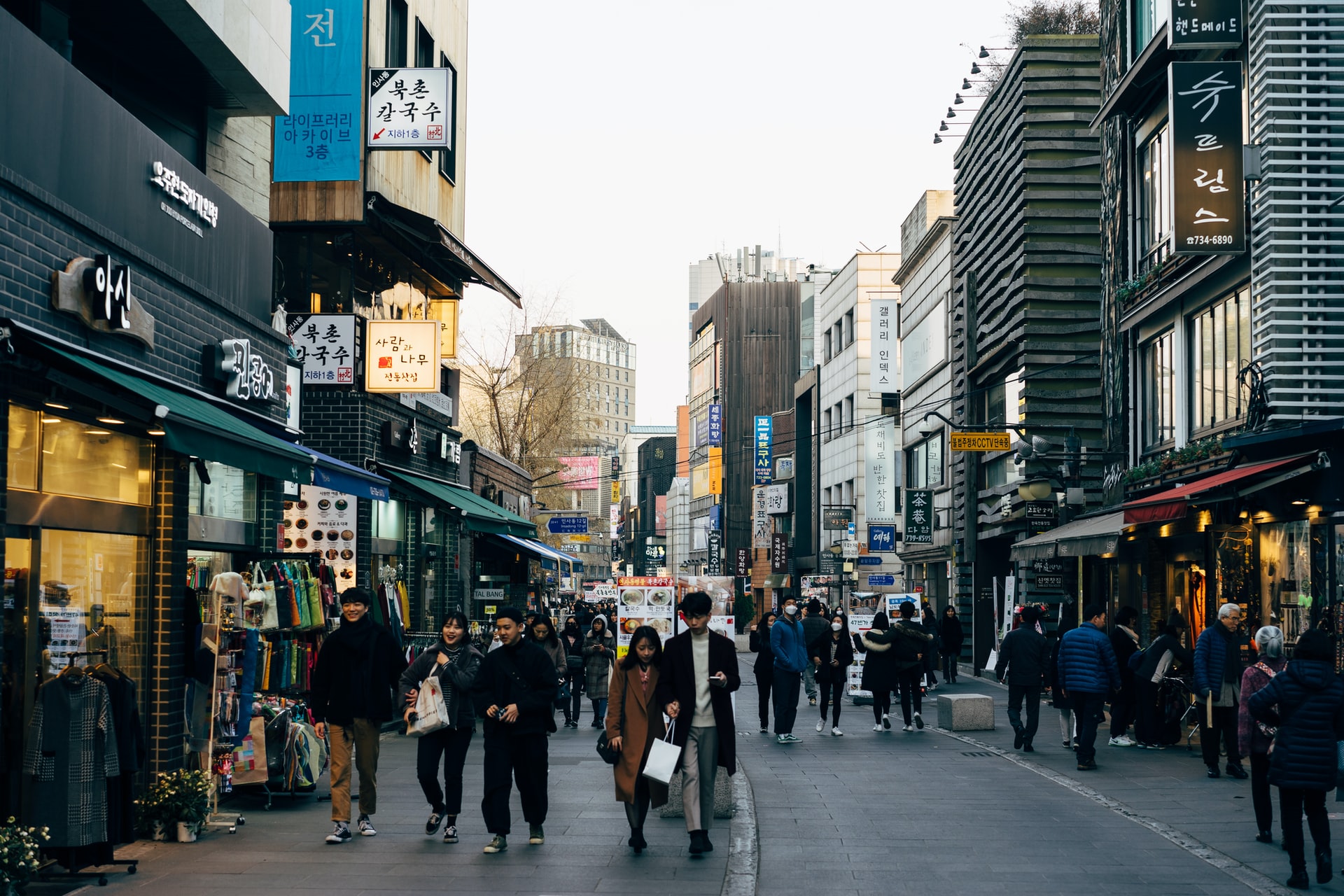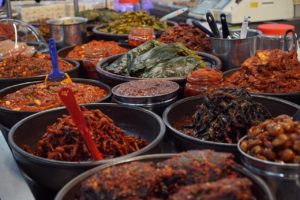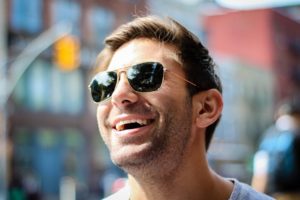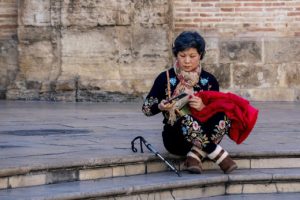도시 doshi: Korean Vocabulary for Towns and Cities
In this post you’ll learn Korean vocabulary for towns and cities. First, you’ll learn key vocabulary for things you see around town. Next, you’ll learn Korean vocabulary for stores. After that you’ll see vocabulary for schools, restaurants, and other buildings you’re likely to see around town. Finally you’ll learn how to ask directions in Korean. All of this vocabulary will help you navigate everyday life in Korean.
Korean Vocabulary for Around Town
First, let’s start with some basic general vocabulary: 건물 geonmul building; 아파트 apateu apartment building 사무실 samushil office building; 길 gil street; 고속도로 gosokdoro highway; 인도 indo sidewalk; 공원 gongwon park; 주차장 juchajang parking lot; 주차공간 juchagonggan parking space; 호텔hotel hotel.
- 호텔이 어디에요?
hotel-i eodieyo?
Where’s the hotel? - 이 근처에 공원이 있어요.
i geuncheo-e gongwon-i isseoyo.
There’s a park near here. - 이 건물에는 아파트가 몇개 있어요?
i geonmureneun apateuga myeotgae isseoyo?
How many apartments are in this building?
Korean Vocabulary for Stores
Next we’ll look at how to say various kinds of stores: 가게gage store; 슈퍼마켓 syupeomaket supermarket; 옷 가게 ot gage clothing store; 신발 가게shinbal gage shoe store; 보석 가게boseok gage jewelry store; 빵집 ppangjip bakery; 제과점 jegwajeom pastry shop; 정육점 jeongyukjeom butcher; 철물점 cheolmuljeom hardware store; 책방/서점 chaekbang/seojeom bookstore; 전자제품 가게 jeonjajepum gage electronics store; 약국yaggug pharmacy.
- 이 거리에는 많은 가게들이 있어요.
i geori-e-neun maneun gagedeuri isseoyo.
There are a lot of stores on this street. - 우리 동네에 큰 슈퍼마켓이 있어요.
uri dongne-e keun syupeomakesh-i isseoyo.
There is a big supermarket in my town. - 신발가게/옷가게/책방이 근처에 있어요?
shinbalgage/ otgage/ chaekbangi geuncheoe isseoyo?
Is there a shoe store/ clothing store/ bookstore nearby?
Korean Vocabulary for Places around Town
Now let’s look at vocabulary for other places around town: 학교 hakgyo school; 도서관doseogwan library; 대학교 daehakgyo university; 소방서 sobangseo firehouse; 우체국 ucheguk post office; 경찰서 gyeongchalseo police station; 병원 byeong-won hosptial; 주유소 juyuso gas station; 교회 gyohoe church; 시나고그shinagogeu synagogue; 절 jeol temple; 모스크moseukeu mosque.
- 학생들은 학교에 있어요.
hagsaengdeul-eun haggyo-e isseoyo.
The students are at school. - 우리 도시에 대학이있어요.
uri doshi-e daehaggyo-i isseoyo.
There’s a university in my city. - 나는 우체국에 갈 거예요.
na-neun uchegug-e gal geoyeyo.
I’m going to the post office. - 나는도서관에 갈 거예요.
na-neun doseogwan-e gal geoyeyo.
I’m going to the library.
Korean Vocabulary for Entertainment
Now let’s look at vocabulary related to fun and entertainment: 식당shikdang restaurant; 술집suljip bar 박물관 bakmulgwan museum; 영화관 yeonghwagwan cinema/movie theater; 극장geukjang theater; 미술관 misulgwan art gallery.
- 좋은 식당이 있어요?
joheun shikdangi isseoyo?
Is there a good restaurant? - 영화 보러 가자.
yeonghwa boleo gaja.
Let’s go to the movies. - 미술관을 방문하고 싶어요.
misulgwan-eul bangmunhago shipeoyo.
We would like to visit an art gallery.
Korean Vocabulary for Transportation
Now let’s look at some vocabulary related to getting around town: 기차역gichayeok train station; 버스 터미널 beoseu teomineol bus station; 버스 정류장beoseu jeongryujang bus stop; 공항 gonghang airport; 지하철 역 jihacheol yeok subway station.
- 기차역은 시내에 있어요.
gichayeog-eun shinae-e isseoyo.
The train station is downtown. - 나는 기차를 타고 도시에 가요.
na-neun gicha-reul tago doshi-e gayo.
I take the train to the city. - 나는 버스를 타고 공항에 가요.
na-neun beoseureul tago gonghang-e gayo.
I take the bus to the airport.
How to Ask Directions in Korean
Finally, let’s end with a few expressions related to asking directions: 여기yeogi here; 거기 geogi there (by you); 저기jeogi over there, 오른쪽 oreunjjog right; 왼쪽oenjjog left; 근처geuncheo nearby; 멀리meolli far away.
- 지하철이 어디에 있어요?
jihacheori eodi-e isseoyo?
Where is the subway? - 여기요.
yeogiyo.
It’s here. - 저기요.
jeogiyo.
It’s there. - 오른쪽이요.
oreunjjogiyo.
It’s to the right. - 왼쪽이요.
oenjjogiyo.
It’s to the left. - 근처예요.
geuncheoyeyo.
It’s nearby. - 멀어요.
meoreoyo.
It’s far away. - 호텔 옆이예요.
hotel yeopiyeyo.
It’s next to the hotel. - 길 건너에요.
gil geonneoeyo.
It’s across the street. - 직진하세요.
jikjinhaseyo.
Go straight. - 왼쪽으로 돌아요.
oenjjogeuro dorayo.
Turn left. - 오른쪽으로 돌아요.
oreunjjogeuro dorayo.
Turn right.
Learn Korean with the Language Garage
We hope you’ve enjoyed learning some Korean vocabulary for towns and cities. Now you know how to use Korean vocabulary for stores, how to ask directions in Korean, and how to talk about places you’re likely to see in everyday life. If you’re interested in learning more, check out our other posts on Korean language, culture, and more. And if you’re looking for convenient and affordable live Korean lessons with a real teacher, check out The Language Garage. Our lessons are given online in a virtual classroom, so it doesn’t matter where you live or work – we can come to you. And we have flexible options, with a free trial so that you can decide if there’s a fit. Check us out!
Photo by Markus Winkler on Unsplash






